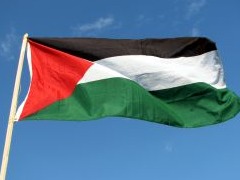3rd May 2014 | International Solidarity Movement, Ramallah Team| Occupied Palestine
Yesterday, Saturday 3rd of May was the United Nations World Press Freedom Day. Yesterday, journalists celebrated, remembered, and protested, on a date commemorated worldwide since 1992.
In Palestine, the 3rd of May calls for a protest by members of the Palestinian Journalists Syndicate (PJS), and yesterday this was at the Beit El military checkpoint.
We witnessed approximately 70 journalists gather in the city of Ramallah, driving towards the Bet El checkpoint, before leaving their cars and attempting to walk through the military gate.
The journalists carried nothing but signs and cameras, chanting for freedom from the Israeli occupation. It was a completely non-violent demonstration.
On arrival to the checkpoint, Israeli Border Police first closed the gate, and then called many more soldiers to the area, who proceeded to watch and film the demonstrators with their private smart phones.
The journalists then tried to open the gate, which is when Israeli Border Police started to throw stun grenades at the demonstrators. More than eight stun grenades were thrown, seemingly directly at the legs of the protesters. One stun grenade hit my ISM colleague in the foot, she was lucky to be wearing thick running shoes and jeans, so did not receive an injury.
The level of aggression was surprising to me, I commented upon this to a demonstrator, a Palestine journalist, causing him to turn to me and smile.
“Maybe they don’t know we’re journalists.”
“Sorry?” I asked.
“If they did, they wouldn’t throw them [the stun grenades] at us.”
He laughed, and walked back toward the gate.
Several times during the protest, the journalists tried to open the gate, each time it was swiftly closed by Israeli forces. After approximately 40 minutes, it seemed the demonstration was ending, and a large group of the journalists began to walk away from the gate.
It was at this point that the Israeli forces present began to throw more stun grenades, roughly six, and one tear gas grenade. Ironically this caused the demonstration to last longer, as after this attack the journalists decided to continue the protest for a further 30 minutes.
After the demonstration ended, in which there were fortunately no injuries or arrests, we had the opportunity to speak to Omar Nazzal, a board member on the steering committee of the PJS.
Omar has been active in journalism for 30 years, and a member of the PJS for the last 18. The PJS was created in Jerusalem in 1978; it was originally named the ‘Arab Journalists League’ as they were not allowed to use ‘Palestinian’ in the title. This changed in 1994, after the Oslo Accords the organization could be renamed.
The PJS has approximately 1300 members, 800 in the West Bank and 500 in the Gaza Strip. It is a member of the Arab Journalists Union and of the International Federation of Journalists.
An issue that is impacting the journalism profession in Palestine, as it does with many workers worldwide, is the impact of globalization. As multinational companies buy out smaller media outlets, individual journalists are loosing their jobs. Or, forcing journalists to move towards shorter-term contracts, loosing their rights, leading to lower wages and little or no insurance.
Omar explained that there are many problems of being a journalist in Palestine, and one huge issue is their treatment by the Israeli authorities.
“They don’t consider Palestinian journalists to be journalists.”
Horrifying statistics echo this statement.
Since the year 2000, approximately 300 journalists have been imprisoned, over 500 have been injured, and 21 Palestinian journalists have been killed by the Israeli military.
Omar continued: “Sometimes they beat journalists, arrest them, shoot them, they’re forbidden to move freely.”
Currently there are nine Palestinian journalists in Israeli military prisons.
Muhammed Muna, one of the imprisoned nine, is a West Bank correspondent of the UK-based Quds Press International News Agency. He was arrested in August 2013. He was sentenced to six months in administrative detention, which essentially means that the Israeli government can hold a person indefinitely without charge. Muhammed’s detention was renewed for a further six months earlier this year, with no release date in sight.

